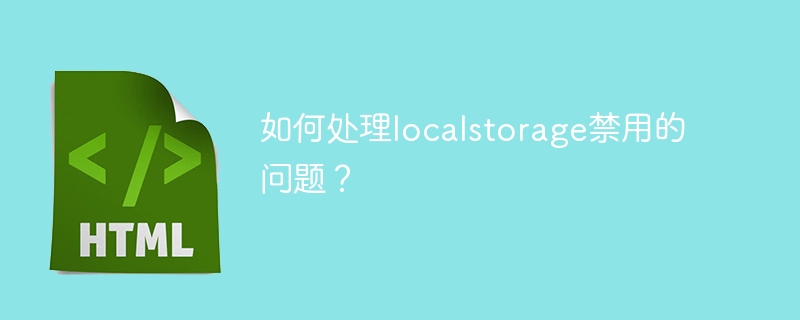Home >Web Front-end >HTML Tutorial >How to solve the problem of disabling localstorage in browsers
How to solve the problem of disabling localstorage in browsers
- WBOYWBOYWBOYWBOYWBOYWBOYWBOYWBOYWBOYWBOYWBOYWBOYWBOriginal
- 2024-01-13 10:11:161796browse

How to deal with the problem of localStorage being disabled?
When we are doing web development, we often use localStorage to store some user data and some configuration information of the website. However, some users disable the browser's localStorage feature, which caused some trouble for our application. In this article, I will introduce some methods to deal with the problem of localStorage being disabled and give specific code examples.
- Detect whether localStorage is available
Before using localStorage, we need to detect whether localStorage is available. We can determine whether localStorage is available by trying to store a test value in localStorage and then trying to read the test value again. The following is a simple sample code:
function isLocalStorageSupported() {
try {
localStorage.setItem("__test__", "test");
localStorage.removeItem("__test__");
return true;
} catch (e) {
return false;
}
}Using this function we can determine whether localStorage is available. If true is returned, it means localStorage is available, otherwise it means localStorage is disabled.
- Use cookies instead of localStorage
If localStorage is disabled, we can consider using cookies instead of localStorage to save some user data. The following is a sample code that saves data to a cookie:
function setCookie(name, value, days) {
var expires = "";
if (days) {
var date = new Date();
date.setTime(date.getTime() + (days * 24 * 60 * 60 * 1000));
expires = "; expires=" + date.toGMTString();
}
document.cookie = name + "=" + value + expires + "; path=/";
}
function getCookie(name) {
var nameEQ = name + "=";
var ca = document.cookie.split(';');
for (var i = 0; i < ca.length; i++) {
var c = ca[i];
while (c.charAt(0) == ' ') c = c.substring(1, c.length);
if (c.indexOf(nameEQ) == 0) return c.substring(nameEQ.length, c.length);
}
return null;
}
// 保存数据到cookie
setCookie("username", "John Doe", 30);
// 从cookie中读取数据
var username = getCookie("username");Use cookies instead of localStorage. It should be noted that cookies have some restrictions. For example, the size of each cookie cannot exceed 4KB. Cookies under each domain name Quantity is also limited.
- Use browser memory instead of localStorage
If localStorage is disabled, we can also consider using browser memory instead of localStorage. In modern browsers, there is an object called sessionStorage, which saves data during a session. The following is a sample code using sessionStorage:
// 保存数据到sessionStorage
sessionStorage.setItem("username", "John Doe");
// 从sessionStorage中读取数据
var username = sessionStorage.getItem("username");Using sessionStorage is similar to localStorage, but the data in sessionStorage will be cleared after the user closes the browser window, while the data in localStorage is permanently saved.
Summary:
There are several ways to deal with the problem of localStorage being disabled, including detecting whether localStorage is available, using cookies instead of localStorage, using browser memory instead of localStorage, etc. In practical applications, we can choose the appropriate method to deal with it according to the specific situation. I hope the content of this article is helpful to you.
The above is the detailed content of How to solve the problem of disabling localstorage in browsers. For more information, please follow other related articles on the PHP Chinese website!

